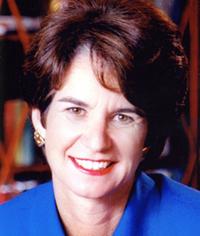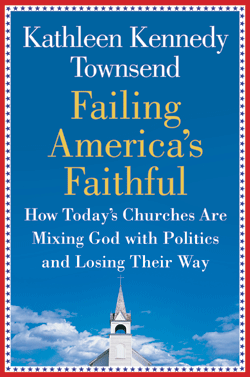 I recently attended an event for a group called Catholic Democrats in Indianapolis and then visited Thomas Merton’s monastery in Kentucky. In just a few days, I moved from the excitement of current politics to the more tranquil world of contemplation and theology. This inspiring week reminded me that Catholicism is not a narrow-minded religion but a universal church encompassing many ways to reach God.
I recently attended an event for a group called Catholic Democrats in Indianapolis and then visited Thomas Merton’s monastery in Kentucky. In just a few days, I moved from the excitement of current politics to the more tranquil world of contemplation and theology. This inspiring week reminded me that Catholicism is not a narrow-minded religion but a universal church encompassing many ways to reach God.
The event I attended in Indianapolis was a joint fundraiser for Catholic Democrats and the Democratic candidate for mayor, Melina Kennedy (no relation). Now 16,000 strong, Catholic Democrats was founded by Patrick Whelan, a rheumatologist at Massachusetts General Hospital. Like me, he felt that Catholics who were focused on a single issue—abortion—were eroding the Church’s tradition of working for the common good.
For the past 20 years or so, it seemed that the Church hierarchy was in cahoots with the Republican party, insisting that good Catholics vote Republican. In 2004, some bishops came out and said it would be sinful to vote for John Kerry, given his pro-choice views. When I campaigned in Iowa during the 2008 presidential primaries, high school students told me that they felt they’d have to go to confession after voting for a pro-choice Democrat.
This inspiring week reminded me that Catholicism is not a narrow-minded religion but a universal church encompassing many ways to reach God.
Since then, a number of groups have begun to protest the hijacking of Catholic teachings by the conservative right. In May, when John Boehner gave the graduation address at Catholic University, more than 75 prominent Catholic academics sent him a letter that said, “From the apostles to the present, the Magisterium of the Church has insisted that those in power are morally obliged to preference the needs of the poor.” They added, “Your record in support of legislation to address the desperate needs of the poor is among the worst in Congress.”
The academics’ letter specifically condemned the House-passed Ryan budget, arguing that it “guts long-established protections for the most vulnerable members of society” and that it had “anti-life implications,” including its cuts to the Women, Infants, and Children program. The letter cited the U.S. Conference of Catholic Bishops’ strong criticisms of the GOP plan. “A just framework for future budgets cannot rely on disproportionate cuts in essential services to poor persons,” two of the bishops wrote. They concluded:
“The moral measure of this budget debate is not which party wins or which powerful interests prevail, but rather how those who are jobless, hungry, homeless or poor are treated. Their voices are too often missing in these debates, but they have the most compelling moral claim on our consciences and our common resources.”
Underlying both letters is the fact that funding for the poor helps reduce the number of abortions—something the bishops recognize.
At the Indianapolis fundraiser, supporters including union leaders, elected officials, and community organizers were thrilled to hear Catholic Democrats pledge financial and theological support to the fight for a broader agenda. They were determined to live up to the root meaning of “Catholic”—that is, “universal,” by addressing a range of questions including how to provide for the “homeless, the hungry, the sick, and the tired, the stranger and the prisoner.”
Inspired by this message, I went on from Indianapolis to visit the Abbey of Gethsemani near Louisville, Kentucky. There my focus shifted from current politics to the gifted progressive theologians who lived and taught at Gethsemani beginning in the 1940s.
I feel drawn to monasteries and the time for prayer and reflection they provide. I’ve often visited St. Benedict’s, in Colorado, and attended Mass at Christ in the Desert in New Mexico. But I’d never been to Gethsemani. I’d wanted to visit it for a long time, because my godfather, Danny Walsh, had taught theology there for many years. My mother chose Father Danny to be my godfather because she liked him so much when he taught her theology at Manhattanville College of the Sacred Heart. I never met him, though, because he moved to Gethsemani soon after I was christened, and died in 1975. When I was growing up, he sent me fruit cakes every Christmas. (My brother Joe, on the other hand, had my uncle John Kennedy as his godfather, and would receive prints of ships, scrimshaw, or wonderful books every year—not that I noticed!)
Gethsemani houses about 50 Trappist monks. One of my hosts, Brother Patrick, had been a monk for 60 years. He told me that my godfather was the most marvelous teacher, and he showed me a picture of Fr. Danny, Thomas Merton, and Jacques Maritain talking under the trees at the monastery. Then he took me to my godfather’s grave, where I said a prayer.
Thomas Merton, who lived at Gethsemani for almost 30 years, attributes his conversion to Catholicism to Fr. Danny in his wonderful autobiography, The Seven Storey Mountain. I was in awe to find myself in the place that Merton called “the center of America” and to see where he had walked, prayed, written, and welcomed the leaders of many world faiths.
Brother Patrick told me that some Catholics thought Merton was in hell, because he had reached out to people of other faiths. Baptists, Jews, Muslims, Hindus, and Buddhists including the Dalai Lama had visited Merton at Gethsemani. He believed that although there was only one God, there were many different ways to reach Him.
Brother Patrick had been Merton’s last secretary, whereas my grandmother, Ann Skakel, had been his first. Merton would send her drafts of his books and she would type them up. She painstakingly made four carbon copies, sending back two for the Trappist and Archdiocese censors to correct. They were quite strict. For example, Merton could write about peace, but not about war. When Pope John XXIII issued the encyclical“Pacem in Terris,” Merton dryly commented, “Lucky he didn’t have to submit it to the Trappist censors.”
My grandmother kept the original typescripts and had them carefully bound. When she died, she left them to the monastery, and there they stayed for years. The monks eventually changed their minds about keeping them there when they realized that many scholars would want to read them and that most of the scholars were women. Uncomfortable with the idea of women spending so much time with them, they gave the papers to a library in Louisville, where they’ve formed the basis of the more than 200 Ph.D. theses that have been written about Merton.
Occasional women visitors are welcome at Gethsemani, and in fact there were three of us this time. Phyllis Schiff, the mother of a friend of my daughter, had offered to come with me, saying it would be “a good education for a Jewish girl from New Jersey who grew up keeping kosher.” And she had brought a close friend of hers who was Catholic. Phyllis was struck by the signs that were posted in the halls and the cafeteria and throughout the garden: Silence is spoken here. “That’s so unlike Judaism; we talk all the time,” she said to us. “The whole culture is devoted to noise, to discussion, debate, poking holes in your opponent’s positions, even in your own.”
“And Jacob argued with God,” I recalled. How different from Gethsemani, where the monks tried to find God in peace, contemplation, and obedience.
Just as Phyllis wondered about silence, I had a hard time understanding the value of obedience, which I felt went along with the Church’s discrimination against women. I said as much to the monks and suggested that the Church could be wrong. After all, the Pope had finally apologized to Galileo after 350 years. The monks quite deftly demurred, saying that men with their big egos probably had a greater need than women to learn obedience in order to find their better selves. We left it at that.
Leaving Gethsemani, I saw on the monastery wall a quotation from Jean Cardinal Danielou that brought home for me the true catholic spirit of Thomas Merton, Fr. Danny, and the Catholic Democrats:
“Too often we think of hope in too individualistic a manner as merely personal salvation. But hope essentially bears on the great actions of God concerning the whole world of salvation. It bears on the destiny of all humanity. God cares for all creatures, not just Catholics or even Christians. It is the salvation of the world that we await.”
Cross-posted, with the author’s permission from Atlantic.com.










Leave a Reply